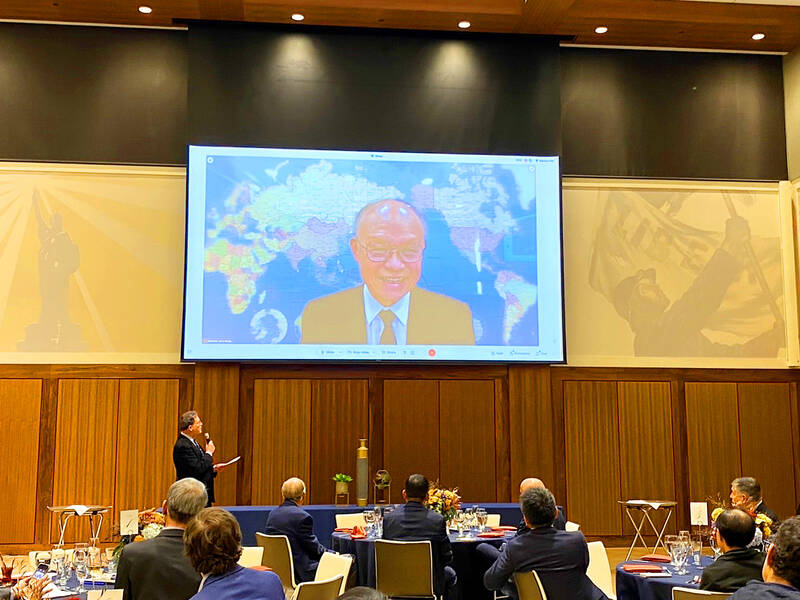Taiwan’s economic security is critical for US technological leadership and supply chain resilience, Minister Without Portfolio John Deng (鄧振中), who heads the Executive Yuan’s Office of Trade Negotiations, said yesterday.
Deng made the statement in a keynote speech at a meeting of the Hoover Project on Taiwan in the Indo-Pacific Region via teleconference that emphasized geopolitical aspects of the bilateral economic relationship.
The Hoover Institution’s project supports research and dialogue about Taiwan’s democracy and society, and “the pivotal position Taiwan occupies” in the world, according to its Web site.

Photo Courtesy of the Executive Yuan’s Office of Trade Negotiations
The tension in the Taiwan Strait is a result of systemic competition between market-centric democracies and authoritarian regimes that practice state capitalism through a planned economy, Deng said.
Taiwan’s economic prowess and resilience — which are a result of 50 years of peace and stability — have ensured the country plays a crucial role in the global supply chain, he said, adding that US collaboration with Taiwan would make global trade safer and stronger.
Taipei and Washington have cause to be concerned about the challenges the global economic system faces, a crisis underscored by recent events at the WTO, he said.
Taiwan’s economy is built on the foundations of fair, free and competitive international trade, which can be made more robust and efficient by closer cooperation between the country and the US, Deng said.
Taiwan’s and the US’ core interests are compatible, as they both depend on the inclusive, rules-based system of international trade that exists now and ensuring that the next global crisis does not disrupt supply chains, he said.
Any harm to Taiwan’s economic safety would weaken US leadership in key fields, Deng said, adding that China has achieved partial success in its bid to create self-sufficient supply chains in crucial sectors, including semiconductor manufacturing.
Taiwan is a trusted partner of the US and its allies, and an indispensable link in global supply chains that must not be broken, he said.
The country’s economic security is part of its national security, and affects the national security and interests of the US, and the health of the US-led international order, he said.
The Economic Prosperity Partnership Dialogue, Technology Trade and Investment Collaboration framework, Trade and Investment Framework Agreements and US-Taiwan Initiative on 21st-Century Trade are the key mechanisms of Taiwan-US cooperation, he said.
The last of these is being negotiated, he said, adding that he hopes the talks can be completed by the end of next year.
Signing a deal based on the Taiwan-US Initiative on 21st-Century Trade would send a strong message to the international community that the US can and will support Taiwan with actions, which would have political and economic significance, he said.
A more robust economic partnership would be beneficial for both countries and the international community, he said.

A Chinese aircraft carrier group entered Japan’s economic waters over the weekend, before exiting to conduct drills involving fighter jets, the Japanese Ministry of Defense said yesterday. The Liaoning aircraft carrier, two missile destroyers and one fast combat supply ship sailed about 300km southwest of Japan’s easternmost island of Minamitori on Saturday, a ministry statement said. It was the first time a Chinese aircraft carrier had entered that part of Japan’s exclusive economic zone (EEZ), a ministry spokesman said. “We think the Chinese military is trying to improve its operational capability and ability to conduct operations in distant areas,” the spokesman said. China’s growing

Nine retired generals from Taiwan, Japan and the US have been invited to participate in a tabletop exercise hosted by the Taipei School of Economics and Political Science Foundation tomorrow and Wednesday that simulates a potential Chinese invasion of Taiwan in 2030, the foundation said yesterday. The five retired Taiwanese generals would include retired admiral Lee Hsi-min (李喜明), joined by retired US Navy admiral Michael Mullen and former chief of staff of the Japan Self-Defense Forces general Shigeru Iwasaki, it said. The simulation aims to offer strategic insights into regional security and peace in the Taiwan Strait, it added. Foundation chair Huang Huang-hsiung

PUBLIC WARNING: The two students had been tricked into going to Hong Kong for a ‘high-paying’ job, which sent them to a scam center in Cambodia Police warned the public not to trust job advertisements touting high pay abroad following the return of two college students over the weekend who had been trafficked and forced to work at a cyberscam center in Cambodia. The two victims, surnamed Lee (李), 18, and Lin (林), 19, were interviewed by police after landing in Taiwan on Saturday. Taichung’s Chingshui Police Precinct said in a statement yesterday that the two students are good friends, and Lin had suspended her studies after seeing the ad promising good pay to work in Hong Kong. Lee’s grandfather on Thursday reported to police that Lee had sent

BUILDUP: US General Dan Caine said Chinese military maneuvers are not routine exercises, but instead are ‘rehearsals for a forced unification’ with Taiwan China poses an increasingly aggressive threat to the US and deterring Beijing is the Pentagon’s top regional priority amid its rapid military buildup and invasion drills near Taiwan, US Secretary of Defense Pete Hegseth said on Tuesday. “Our pacing threat is communist China,” Hegseth told the US House of Representatives Appropriations Subcommittee on Defense during an oversight hearing with US General Dan Caine, chairman of the Joint Chiefs of Staff. “Beijing is preparing for war in the Indo-Pacific as part of its broader strategy to dominate that region and then the world,” Hegseth said, adding that if it succeeds, it could derail